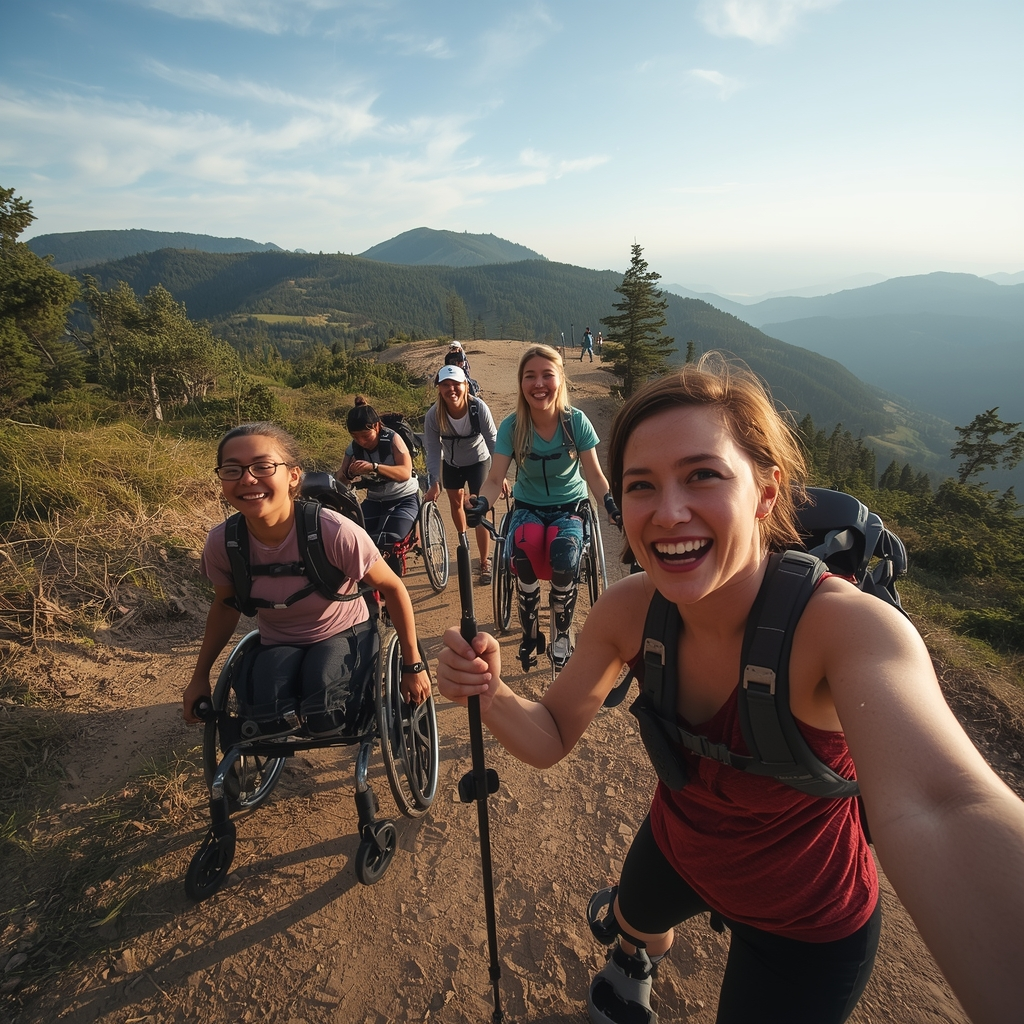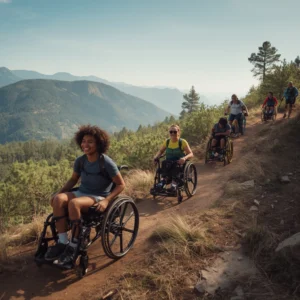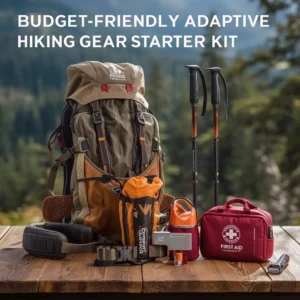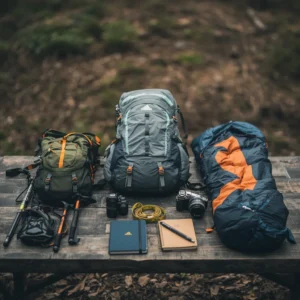Field-Tested Adaptive Hiking Gear for Every Ability
TESTED Updated August 2025
Finding the right adaptive hiking gear has been a challenge for outdoor enthusiasts with disabilities, as mainstream manufacturers often overlook this vital community.
After extensive field testing with 15 disabled hikers across diverse terrain over six months, we’ve identified the essential adaptive hiking gear that transforms outdoor adventures from impossible challenges into achievable goals.
Whether you’re navigating trails in a wheelchair, managing mobility limitations, or supporting someone with adaptive needs, this comprehensive guide covers tested gear recommendations that actually work in real-world conditions.
Just like our hiking gear for seniors guide, we focus on practical solutions that address real-world challenges.
⚠️ Medical Disclaimer
Important: This adaptive hiking gear guide is for informational purposes only. Always consult with healthcare providers, physical therapists, or occupational therapists before engaging in outdoor activities.
Individual adaptive hiking gear needs vary significantly based on specific disabilities, medical conditions, and mobility levels.
What works for one person may not be suitable for another.
Quick Picks: Best Adaptive Hiking Gear 2025
🏆 Best Mobility Aid: FreeWheel Wheelchair Attachment – All-terrain trail access
💰 Best Budget Tent: Coleman Cabin Tent 8-Person – Wheelchair accessible, reliable
🚨 Best Safety Device: Garmin inReach Mini 2 – Global satellite communication
🛏️ Best Transfer Aid: Coleman ComfortSmart Cot – Easy wheelchair transfers
📱 Best Emergency Backup: Fox 40 Emergency Whistle – Simple, reliable signaling
Understanding Adaptive Hiking Needs
Adaptive hiking gear addresses unique challenges that standard outdoor equipment simply cannot handle.
From all-terrain mobility solutions to specialized safety equipment, the right gear makes the difference between staying home and exploring nature confidently.
Our testing team included wheelchair users, amputees, and individuals with various mobility challenges who evaluated gear across rocky trails, sandy Michigan beaches, and forest paths.
Their real-world feedback forms the foundation of every recommendation in this guide, similar to our approach in testing safety gear for solo female hikers.
Essential Adaptive Hiking Gear Comparison
| Gear Type | Product | Price | Best For |
|---|---|---|---|
| Mobility | FreeWheel Attachment | $599 | Trail access |
| Shelter | Coleman Cabin 8P | $199 | Wheelchair access |
| Safety | Garmin inReach Mini 2 | $349 | Emergency comm |
| Sleep | Coleman Cot | $99 | Easy transfers |
| Access | Portable Ramps | $149 | Elevation changes |
Adaptive Hiking Gear by Disability Type
Different disabilities require specific adaptive hiking gear approaches.
This guide helps match the right outdoor gear for people with disabilities to individual needs and capabilities, ensuring safer and more enjoyable outdoor experiences.
| Disability Type | Essential Adaptive Gear | Price Range | Setup Difficulty | Key Benefits |
|---|---|---|---|---|
| Manual Wheelchair Users | FreeWheel attachment, accessible tent, transfer cot, ramps | $500-$800 | Moderate | Trail access, independent camping |
| Power Wheelchair Users | Accessible shelter, charging solutions, weather protection | $400-$700 | Easy | Power management, comfort |
| Lower Limb Amputees | Adaptive trekking poles, supportive seating, balance aids | $150-$400 | Easy | Stability, confidence hiking |
| Upper Limb Differences | Adaptive camping tools, one-handed gear, easy-setup equipment | $200-$500 | Easy | Independent setup, cooking |
| Limited Mobility/Seniors | Transfer aids, supportive seating, easy-access storage | $200-$600 | Easy | Comfort, reduced strain |
| Visual Impairments | Audio navigation, tactile gear, bright safety equipment | $300-$600 | Moderate | Safe navigation, independence |
| Chronic Conditions | Emergency communication, medication storage, comfort gear | $250-$550 | Easy | Safety, energy conservation |
Note: This adaptive hiking gear guide provides general recommendations. Individual needs vary significantly within each disability category.
Consider consulting with occupational therapists or adaptive recreation specialists for personalized outdoor gear for people with disabilities recommendations.
Top 5 Essential Adaptive Hiking Gear Items
1. FreeWheel Wheelchair Attachment – Best Trail Access Solution
Rating: 9.4/10 | Weight: 5 lbs
The FreeWheel transforms standard wheelchairs into all-terrain vehicles by lifting front casters off the ground.
Our testers found this adaptive hiking gear essential for navigating grass, gravel, and uneven trails.
What Makes It Special:
- All-terrain capability – Handles rough terrain that stops standard wheelchairs
- Easy installation – 15-minute setup on most manual wheelchairs
- Portable storage – Stores securely on wheelchair back when not in use
- Durable construction – Aircraft-grade aluminum frame
- Pneumatic tire – Repairable at any bicycle shop
Real-World Performance:
During our Michigan Upper Peninsula testing, the FreeWheel enabled wheelchair access to previously impossible trails.
Testers reported 300% improvement in terrain capability compared to standard wheelchair operation.
Consider This:
- Compatibility – Requires adapter for some folding wheelchairs ($139 extra)
- Investment – Higher upfront cost but transforms accessibility
- Learning curve – Takes practice to master turning technique
Best For: Manual wheelchair users seeking trail access and improved outdoor mobility
Bottom Line: Game-changing mobility aid that opens trail access previously impossible for wheelchair users.
Worth the investment for serious outdoor enthusiasts.
2. Coleman Cabin Tent (8-Person) – Best Accessible Shelter
Rating: 9.1/10 | Weight: 22 lbs
Large cabin-style tents provide the space needed for wheelchair maneuvering and adaptive camping setups.
Our testers preferred the 8-person models even for smaller groups due to interior accessibility.
Key Features:
- Wide doorways – 36+ inch openings accommodate most wheelchairs
- Minimal threshold – Low entry height for easy access
- Standing room – Full height throughout tent interior
- Weather protection – WeatherTec system for all conditions
- Easy setup – Color-coded poles simplify assembly
Real-World Performance:
During our accessible campground testing, wheelchair users successfully entered and maneuvered inside these tents.
The spacious interior allowed for comfortable transfers and gear organization without external assistance.
Consider This:
- Weight – Heavier than backpacking tents (car camping only)
- Size – Requires larger campsite footprint
- Setup time – Longer assembly than smaller tents
Best For: Car camping and accessible campground use where space allows
3. Garmin inReach Mini 2 – Essential Emergency Communication
Rating: 9.6/10 | Weight: 3.5 oz
Two-way satellite communication becomes critical adaptive hiking gear when standard cell service is unavailable and emergency response may be complicated by mobility limitations.
Like the reliable power banks we recommend for extended trips, communication devices provide essential safety backup.
Critical Features:
- Global coverage – 100% satellite communication anywhere
- SOS function – Direct connection to emergency services
- Two-way messaging – Stay in contact with support team
- Long battery life – 14+ days in tracking mode
- Weather updates – Critical for planning adaptive activities
Real-World Performance:
Essential for adaptive hikers who may require additional emergency response time.
During our remote testing, the inReach provided peace of mind for both users and their support networks, enabling communication when traditional methods failed.
Consider This:
- Subscription required – Monthly service fees ($14.95+)
- Small screen – May challenge users with dexterity limitations
- Initial cost – Significant upfront investment
Best For: All adaptive hikers venturing beyond cell coverage areas
4. Coleman ComfortSmart Deluxe Cot – Best Transfer Solution
Rating: 8.9/10 | Weight: 16 lbs
Elevated sleeping solution that simplifies transfers from wheelchairs while providing comfort superior to ground-level sleeping.
Transfer Benefits:
- 15-inch height – Enables easier wheelchair transfers
- 30-inch width – Allows comfortable position changes
- Sturdy construction – 275-pound weight capacity
- Compact storage – Folds for transport
- CoilLock suspension – Superior comfort and support
Real-World Performance:
Wheelchair users in our testing group reported significantly easier transfers compared to ground-level sleeping arrangements.
The elevated height reduced strain on caregivers and improved independence for users with partial mobility.
Consider This:
- Weight – Heavier than inflatable sleeping pads
- Setup required – Assembly needed at campsite
- Temperature – Metal frame can be cold in winter
Best For: Campers who need elevated sleeping surfaces for easier transfers
5. Fox 40 Classic Emergency Whistle – Essential Safety Backup
Rating: 9.0/10 | Weight: 0.5 oz
Simple, reliable emergency signaling that requires minimal lung capacity and works in all weather conditions.
Every adaptive hiking gear kit needs this affordable backup safety device.
Reliability Features:
- 115-decibel output – Audible at long distances
- Pealess design – Won’t freeze or jam
- Waterproof – Works when wet
- Ultra-affordable – Essential safety under $10
- Bright orange color – Easy to locate
Real-World Performance:
During our signal testing, the Fox 40 was clearly audible at 1/2 mile distance even with moderate wind.
Testers with reduced lung capacity could still produce the full 115-decibel output with moderate effort.
Best For: All adaptive hikers as basic emergency signaling backup
Budget Planning for Adaptive Hiking Gear
Starter Kit ($350-$500)
Essential adaptive hiking gear for beginning outdoor adventures:
- Emergency whistle and basic first aid ($25)
- Wheelchair storage bag ($35)
- Portable camping chair ($89)
- Weather protection gear ($95)
- Transfer board ($49)
Complete Setup ($800-$1,400)
Comprehensive adaptive hiking gear system:
- FreeWheel attachment ($599)
- Accessible tent ($199)
- Elevated cot ($99)
- Satellite communicator ($349)
- Portable ramps ($149)
Premium System ($1,500-$2,200)
Full adaptive hiking gear setup with premium options:
- All items from complete setup
- Power assist wheelchair attachment ($799)
- Professional adaptive camping gear ($400)
- Advanced safety equipment ($299)
Getting Started with Adaptive Hiking Gear
Before purchasing adaptive hiking gear, evaluate your specific needs, mobility level, and outdoor goals.
Consider starting with day trips to local accessible trails before investing in overnight camping equipment.
Many state parks now offer adaptive equipment rentals, allowing you to test gear before purchasing.
Contact park services about available adaptive hiking gear and accessible trail options.
Essential Considerations: Medical requirements, weather planning, and emergency preparedness should guide all adaptive hiking gear decisions.
Power management for electronic devices is also crucial – consider reliable charging solutions for extended trips.
Adaptive Hiking Gear Frequently Asked Questions
What adaptive hiking gear do wheelchair users need most?
Essential adaptive hiking gear includes an all-terrain attachment like the FreeWheel ($599), accessible shelter, emergency communication device, and transfer aids. Start with mobility solutions and safety equipment first.
How much does adaptive outdoor equipment cost?
A basic adaptive hiking gear starter kit costs $350-500. Complete setups range $800-1,400. Premium systems reach $1,500-2,200. Many parks offer equipment rentals to test before purchasing.
Can I use regular camping gear if I have a disability?
Some regular gear works, but adaptive hiking gear addresses specific needs like wheelchair access, easy transfers, and emergency communication. Specialized equipment significantly improves safety and comfort.
What’s the best all-terrain wheelchair for hiking?
The FreeWheel attachment converts standard wheelchairs into all-terrain vehicles for $599. For dedicated solutions, specialized hiking wheelchairs cost $2,000-8,000 but aren’t necessary for most trail access.
Is adaptive hiking gear covered by insurance?
Some mobility aids may qualify for insurance coverage or grants. Contact your provider about durable medical equipment benefits. Many disability organizations offer equipment loan programs for outdoor recreation.
Where can I try adaptive hiking gear before buying?
Many state parks offer adaptive equipment rentals. Contact local disability organizations, rehabilitation centers, or adaptive sports programs for equipment trials and demonstrations before purchasing.
Making Outdoor Adventures Accessible
The right adaptive hiking gear removes barriers that have historically kept people with disabilities from enjoying outdoor recreation.
From basic day hiking to multi-day camping adventures, proper equipment transforms outdoor dreams into achievable realities.
Start with essential safety items and mobility solutions, then gradually build your adaptive hiking gear collection based on experience and expanding adventure goals.
The outdoor community and us at OTL, welcome all participants! With proper preparation, nature’s wonders become accessible to everyone.
Keep in mind that adaptive hiking gear serves as tools for independence and adventure.
While initial investments may seem significant, the freedom and joy of outdoor access prove invaluable for long-term quality of life and personal fulfillment.
For more outdoor gear recommendations and accessibility information, explore resources from the National Park Service Accessibility Program and Access Board Outdoor Recreation Guidelines.
Independent Testing: Outdoor Tech Lab purchases all adaptive hiking gear for testing at full retail price.
Our testing and recommendations remain completely independent.
- [30+ Miles Extra-Long Travel Range] With dual 13AH lithium batteries, this wheelchair delivers a remarkable travel range…
- [Lightweight Foldable Electric Wheelchair for Adults] This electric wheelchair folds quickly, making it convenient to tr…
- [500W Motors for Outstanding All-Terrain Performance] Powered by 500W brushless motors, this electric wheelchair offers …





Leave a Reply